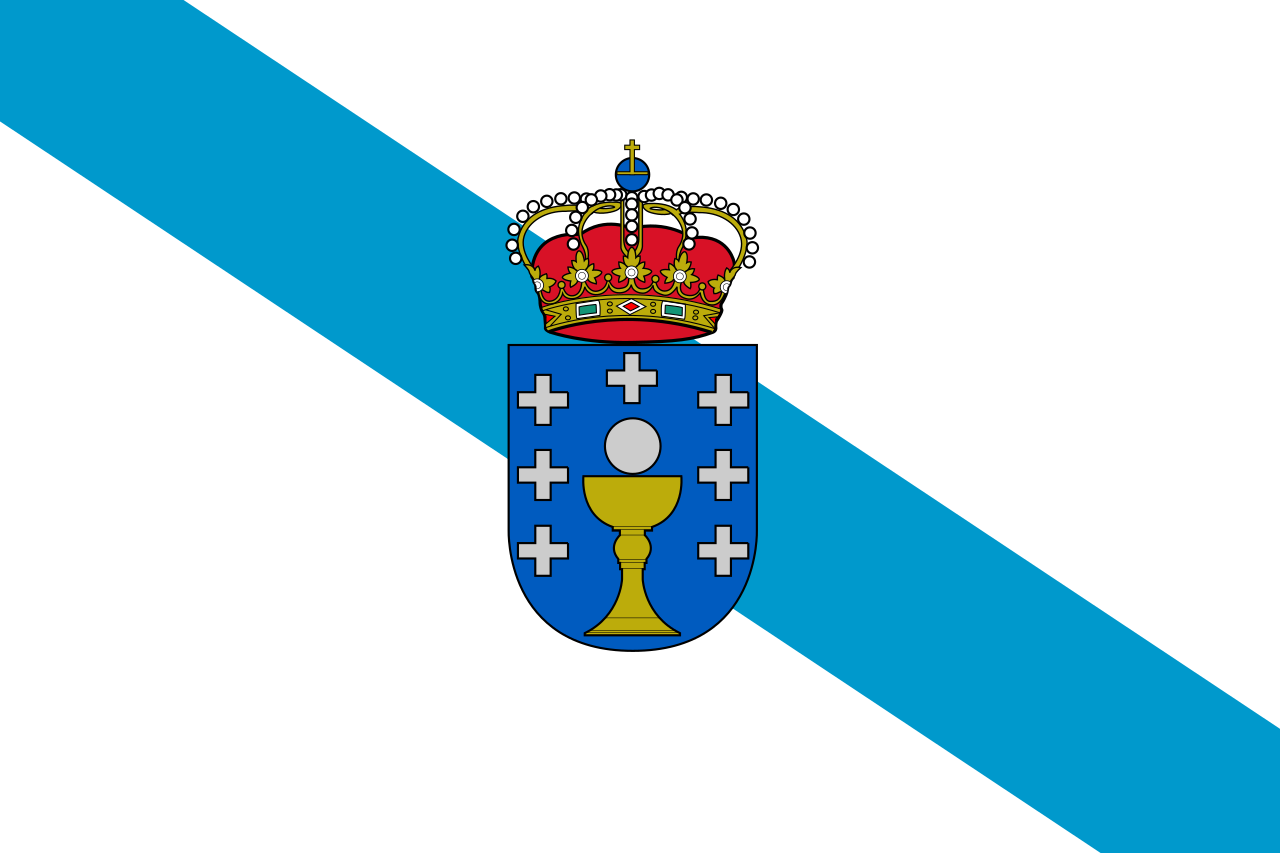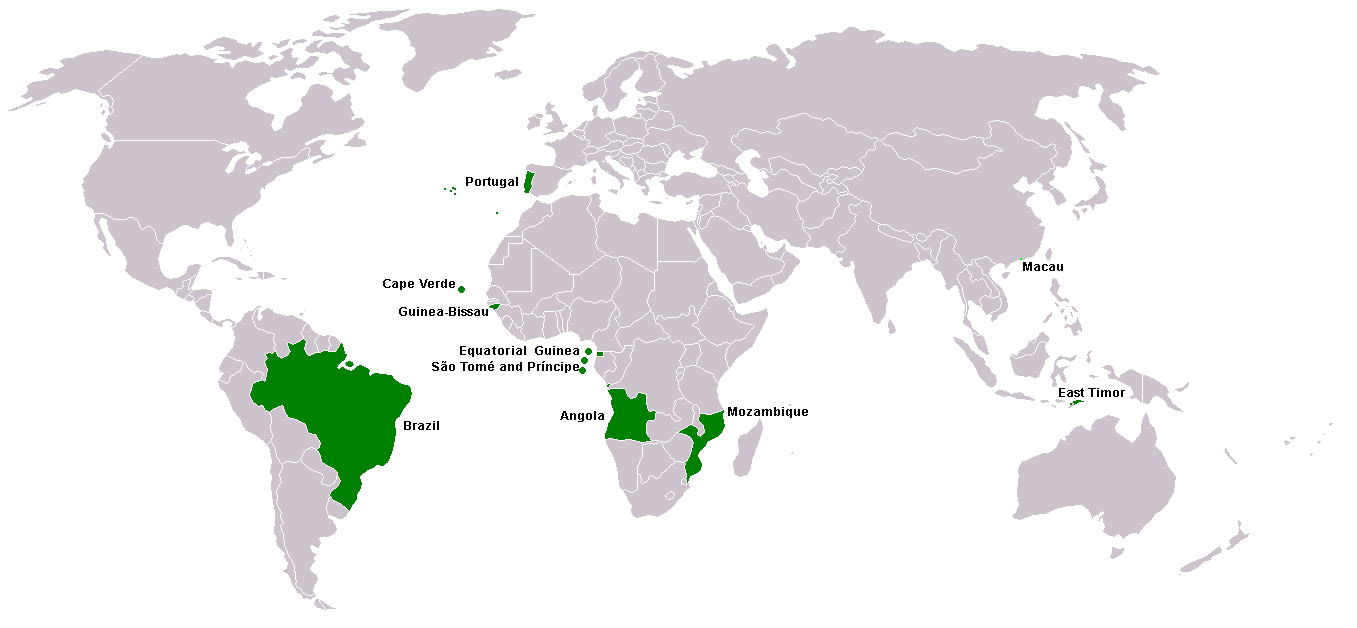German — Chinese

 Angola
Angola
 Equatorial Guinea
Equatorial Guinea
 Brazil
Brazil
 Demokratische Republik Timor-Leste
Demokratische Republik Timor-Leste

 Galicia
Galicia
 Guinea-Bissau
Guinea-Bissau
 Kap Verde
Kap Verde

 Literature
Literature
 Macau Tebiexingzhengqu-MO
Macau Tebiexingzhengqu-MO
 Mosambik
Mosambik
 Portugal
Portugal
 Sao Tome und Principe
Sao Tome und Principe

Die portugiesische Sprache (portugiesisch português) ist eine Sprache aus dem romanischen Zweig der indogermanischen Sprachfamilie und bildet mit dem Spanischen (der kastilischen Sprache), Katalanischen und weiteren Sprachen der Iberischen Halbinsel die engere Einheit des Iberoromanischen. Zusammen mit dem Galicischen in Nordwest-Spanien geht sie auf eine gemeinsame Ursprungssprache zurück, das Galicisch-Portugiesische, das sich zwischen Spätantike und Frühmittelalter entwickelte. Nach der Herausbildung der Staatlichkeit Portugals entwickelten sich daraus die beiden heutigen Sprachen. Heute gilt Portugiesisch als Weltsprache.
Es wird von über 240 Millionen Muttersprachlern gesprochen; einschließlich der Zweitsprachler beläuft sich die Zahl der Sprecher auf etwa 270 Millionen.
Die portugiesische Sprache verbreitete sich weltweit im 15. und 16. Jahrhundert, als Portugal sein Kolonialreich aufbaute, das in Teilen bis in das Jahr 1975 überdauerte und das heutige Brasilien sowie Gebiete in Afrika und an den Küsten Asiens umfasste. Als letztes ging Macau aus portugiesischem Besitz an China über. Daraus ergab sich, dass Portugiesisch heute die Amtssprache mehrerer unabhängiger Staaten ist und darüber hinaus von vielen Menschen als Minderheiten- oder Zweitsprache gesprochen wird. Neben dem eigentlichen Portugiesischen gibt es etwa zwanzig Kreolsprachen auf überwiegend portugiesischer Basis. Durch die Auswanderung aus Portugal ist Portugiesisch in den letzten Jahrzehnten in mehreren Staaten Westeuropas und in Nordamerika zu einer wichtigen Minderheitensprache geworden.
葡萄牙语(Português)简称葡语,是罗曼语族的一种语言。葡语以使用国家数量来算是世界排名第七的语言,使用地区包括葡萄牙、巴西、安哥拉、莫桑比克、佛得角、圣多美和普林西比、几内亚比绍、东帝汶和澳门,共计九个国家或地区。超过两亿人口以葡萄牙语为母语。
由于葡萄牙从15世纪和16世纪开始向外进行殖民扩张,建立了包括美洲的巴西、亚洲的澳门的殖民统治,葡萄牙语也成为某些地区最常用的第二外语,如西印度的达曼-第乌联邦区,以及马来西亚的马六甲州。
最古早的葡萄牙语,源于中世纪的加里西亚王国所使用的一支通俗拉丁语变体。今日的母语人口约为2.1亿左右,若包含第二语言使用者则约为2.4亿人,通常被列为母语人口世界第6或第7多的语言[注 1]。葡萄牙语使用区域占地相当广泛,同时主要因为巴西众多的人口,葡萄牙语也是南半球最多人使用的语言,和拉丁美洲仅次于西班牙语的第二大语言。
西班牙作家米格尔·德·塞万提斯曾把葡萄牙语称作“甜蜜的语言”,巴西诗人奥拉沃·比拉克则把葡萄牙语比作“última flor do Lácio, inculta e bela”,意即“拉齐奥最后一朵绚烂的野花”。
葡语界目前唯一的诺贝尔文学奖得主,若泽·萨拉马戈曾说:“世上没有葡萄牙语这种语言,而是有很多语言使用葡语。”
ポルトガル語(ポルトガルご、português [puɾtuˈgeʃ]/[poɾtuˈges], língua portuguesa)は、主にポルトガル及びブラジルとその他の9の国と地域で公用語として使われている言語である。俗ラテン語から発展して形成されたロマンス語の1つで、スペイン語などと共にインド・ヨーロッパ語族イタリック語派に属する。
スペインの作家セルバンテスはポルトガル語を「甘美な言語」と評し、ブラジルの詩人オラーヴォ・ビラックは「ラティウムの最後の、粗野で美しい花」と評している。
ポルトガル語は、大航海時代のポルトガル海上帝国の成長とともにアジア・アフリカ地域に広まった。日本では最初に伝播したヨーロッパの言語であり、古くからの外来語として定着しているいくつかの単語は、ポルトガル語由来である。代表的な例として「パン」があり、戦国時代にキリスト教と共に伝わった。
Portuguese (português or, in full, língua portuguesa) is a Romance language originating in the Iberian Peninsula of Europe. It is the sole official language of Portugal, Angola, Mozambique, Guinea-Bissau, Cape Verde, São Tomé and Príncipe, and Brazil,[6] while having co-official language status in East Timor, Equatorial Guinea, and Macau. A Portuguese-speaking person or nation is referred to as "Lusophone" (lusófono). As the result of expansion during colonial times, a cultural presence of Portuguese and Portuguese creole speakers are also found around the world.[7] Portuguese is part of the Ibero-Romance group that evolved from several dialects of Vulgar Latin in the medieval Kingdom of Galicia and the County of Portugal, and has kept some Celtic phonology and its lexicon.[8][9]
With approximately 215 to 220 million native speakers and 50 million L2 speakers, Portuguese has approximately 270 million total speakers. It is usually listed as the sixth-most spoken language and the third-most spoken European language in the world in terms of native speakers.[10] Being the most widely spoken language in South America[11][12] and all of the Southern Hemisphere,[13] it is also the second-most spoken language, after Spanish, in Latin America, one of the 10 most spoken languages in Africa,[14] and is an official language of the European Union, Mercosur, the Organization of American States, the Economic Community of West African States, the African Union, and the Community of Portuguese Language Countries, an international organization made up of all of the world's officially Lusophone nations. In 1997, a comprehensive academic study ranked Portuguese, specifically the Brazilian variety, as one of the 10 most influential languages in the world.[15][16]
Le portugais (en portugais : português) est une langue appartenant à la branche romane de la famille des langues indo-européennes. Les locuteurs du portugais s'appellent les lusophones.
Le portugais occupe la sixième place des langues les plus parlées dans le monde si l'on tient compte du nombre de personnes dont c'est la langue maternelle. Il est la langue la plus parlée en Amérique du Sud2 et de l'hémisphère sud3, mais seconde en Amérique latine, après l'espagnol (plus du tiers de la population de l'Amérique latine parle le portugais). En Afrique, le portugais se présente comme une importante langue véhiculaire dans les anciennes colonies portugaises. Il représente au total 227,9 millions de locuteurs dont c'est la langue maternelle1 dans le monde et est ainsi la troisième langue européenne la plus parlée en tant que langue maternelle après l'espagnol (406 millions) et l'anglais (335 millions), et représente 4 %4 du PIB mondial. C'est aussi la cinquième langue par le nombre de pays ayant le portugais comme langue officielle4 et la septième pour le nombre de traductions à destination du portugais4
La « langue de Camões » est parlée au Portugal, y compris l'archipel de Madère et celui des Açores, au Brésil, en Angola, au Mozambique, au Cap-Vert, en Guinée-Bissau, en Guinée équatoriale, à Sao Tomé-et-Principe, au Timor oriental, à Goa (Inde), à Daman et Diu (Inde), Malacca en Malaisie et à Macao (Chine). Il appartient à la famille des langues ibéro-romanes et présente de nombreuses similitudes avec le castillan. Au-delà de ses origines fortement latines, 20 % du lexique portugais tire ses racines ailleurs, en particulier de la langue arabe mais aussi notamment de l'occitan. En Galice (Espagne) est parlé le galicien, avec qui il est très étroitement apparenté. Au Brésil, le tupi-guarani en a influencé le vocabulaire.
Les normes de la langue portugaise sont régies par l’Instituto Internacional da Língua Portuguesa et la Comunidade dos Países de Língua Portuguesa.
Des créoles à base portugaise sont parlés au Cap-Vert, en Guinée-Bissau, au Sénégal et à Sao Tomé-et-Principe.
Il portoghese ( português, /puɾtuˈɣeʃ/, /poɾtuˈɡes/ o /poɾtuˈɡeis/ a seconda delle varietà) è una lingua romanza, appartenente al gruppo delle lingue gallo-iberiche; con 228 milioni di locutori madrelingua (L1), è la nona lingua madre più parlata al mondo, la prima dell'emisfero sud e del subcontinente sudamericano (circa metà dei parlanti), ed è inoltre la seconda lingua neolatina più parlata, dietro soltanto spagnolo
La lingua portoghese si diffuse nel mondo nel XV e XVI secolo, cioè nel momento in cui il Portogallo, il primo e più duraturo impero coloniale e commerciale d'Europa, stava estendendosi dal Brasile, nelle Americhe, fino a Macao, in Cina, e in Giappone.[1] Il risultato di questa espansione è che il portoghese, al giorno d'oggi, è la lingua ufficiale di nove Paesi indipendenti ed è largamente parlato o studiato come seconda lingua in molti altri. Esistono ancora circa venti lingue creole basate sul portoghese.
Importante lingua minoritaria in Andorra, Germania, Lussemburgo, Paraguay, Namibia, Svizzera e Sudafrica, esistono, inoltre, comunità parlanti portoghese in molte città e regioni del mondo, come per esempio Parigi in Francia, Tokyo in Giappone, Boston, New Jersey e Miami negli Stati Uniti d'America, nonché le province argentine di Corrientes, Misiones, Entre Ríos e Buenos Aires.
El idioma portugués (português ![]() escuchar (?·i) o língua portuguesa) es una lengua romance flexiva, procedente del galaicoportugués. Tras la independencia de Portugal en 1139 y la posterior reconquista hacia el sur, el idioma se fue expandiendo por los límites del actual Portugal. Asimismo, la lengua se fue difundiendo en el periodo de los descubrimientos por Brasil, seis países en África y otras partes del mundo.2
escuchar (?·i) o língua portuguesa) es una lengua romance flexiva, procedente del galaicoportugués. Tras la independencia de Portugal en 1139 y la posterior reconquista hacia el sur, el idioma se fue expandiendo por los límites del actual Portugal. Asimismo, la lengua se fue difundiendo en el periodo de los descubrimientos por Brasil, seis países en África y otras partes del mundo.2
Con aproximadamente 260 000 000 de hablantes,1 el portugués es la séptima lengua materna más hablada del mundo y la tercera lengua más hablada en usar el alfabeto latino, después del español y el inglés.1 El portugués es también la lengua más hablada del hemisferio sur, con Angola, Mozambique, Timor Oriental y, en primer lugar, Brasil.
Actualmente, es la lengua principal de Portugal, Brasil, Angola, Guinea-Bissau, Mozambique, Cabo Verde, Santo Tomé y Príncipe y Timor Oriental; todos estos países conforman la Comunidad de países de lengua portuguesa. Asimismo posee una pequeña cantidad de hablantes en Macao (aunque se detecta un importante repunte en su uso por las relaciones comerciales entre China y los países lusófonos) y en Goa; también se habla en su forma criollizada, en algunos sectores de la India, Sri Lanka, Malasia e Indonesia. Se habla también por colonias grandes e importantes de países de habla portuguesa establecidas como Andorra, Luxemburgo, Canadá, Estados Unidos, Namibia, Paraguay, Uruguay, Francia, Japón, Colombia, y Venezuela.3 Además de tener un alto número de hablantes en localidades de la frontera hispano-portuguesa como es el caso de Badajoz o de la La Codosera.[cita requerida]
El portugués es conocido como la «lengua de Camões», el autor del poema épico Os Lusíadas y como «la última flor del Lacio», expresión usada en el soneto Língua portuguesa del escritor brasileño Olavo Bilac.4 Por su parte, Miguel de Cervantes consideraba al portugués una lengua «dulce y agradable».5 En marzo de 2006 abrió sus puertas el Museo de la Lengua Portuguesa en São Paulo, la ciudad con mayor número de lusófonos del mundo.6
Португа́льский язы́к (порт. língua portuguesa) — язык романской группы индоевропейской семьи языков, иберо-романская подгруппа. Развился из средневекового галисийско-португальского языка. Письменность — на основе латинского алфавита. Это второй по числу носителей романский язык после близкородственного испанского и один из самых распространённых языков мира (6—8 места). Говорящие на португальском языке объединяются в общий термин лузофоны по имени римской провинции Лузитания, приблизительно соответствовавшей территории современной Португалии, а вся совокупность португалоязычных территорий — лузофония.





